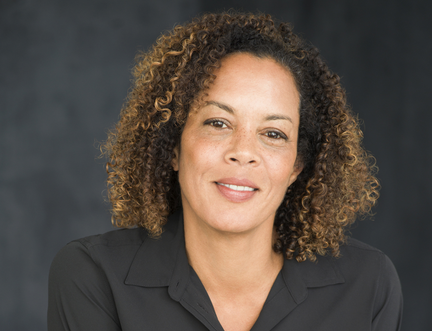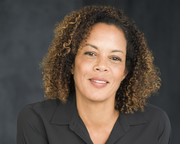Freedom is a Word
By Aminatta Forna

In 2018, we commissioned 51 authors from 25 countries to write essays exploring ideas about freedom for The Freedom Papers, a publication produced in partnership with Gutter Magazine. Read on for Aminatta Forna's essay, and visit guttermag.co.uk to purchase a copy of The Freedom Papers.
There was a time I thought I knew what words meant, I am a writer, after all. Before I became a writer I worked a while as a journalist, and before that I trained as a lawyer, all professions in which the meaning of words matters deeply. I think about words all day, what they mean to different people in different places, what the same words might be taken to mean in another context or time. I think about how the dictionary definition of a word often doesn’t match the way the word is popularly understood. I wonder which one should be conformed to, sometimes I come down on one side of the fence and sometimes the other and increasingly I see language as mobile, words are built on the sands of time and human expression. Sometimes words develop multiple meanings, conjoined, not disparate. The word ‘freedom’ has become one such, a shape shifter word, forming and reforming into different meanings when it is spoken by different mouths.
When I was growing up in West Africa, in Sierra Leone, I don’t remember ever hearing the word ‘freedom’ spoken by ordinary people. They talked instead about what they wished for, which were concrete things: a good harvest, schools, a clinic. The word freedom was perhaps too abstract. It had no real meaning in the context of trying merely to survive. I think, if one pressed further they might have gone on to describe a life improved and enriched by the provision of these things. In this life they would be free of worry, free of hunger, the fear of illness or death or their children’s future.
For a while, as a young teen, I lived in Tehran. It was 1979 and I watched a revolution unfold. There was talk of freedom then, freedom from the reign of the Pahlavi dynasty and then, within years the word was being used by and on behalf of women, who wished for freedom from the newly imposed restrictions on their clothing, on their ability to work, to move in public spaces, to access justice.
Sierra Leone, in the years I lived there, was officially and for many years, the poorest country in the world, regularly ranking lowest UN Human Development Index. I now live in the richest country in the world ever, in the United States, where I have taught for three years. In Sierra Leone, as I say, I grew up never (or should I say rarely, for memory cannot entirely be relied upon) hearing the word ‘freedom.’ By contrast in the United States I hear the word every single day. EVERY. SINGLE. DAY. I read it in the newspapers, I hear it on television, I hear it intoned during political speeches. Americans, the politicians like to remind us, are ‘freedom loving,’ national security decisions are made ‘to protect our freedoms.’ And the word freedom lies at the centre of the two most heated public debates of this decade, freedom of speech and gun control.
In my university years I studied the text of John Stuart Mill’s On Liberty. Mill argued that everyone should be left free to pursue his own interests as long as this does not harm the interests of others. And therein lies the rub.
The moving boundary is the exact point where harm lies. When we talk about freedom of speech, I am always made uncomfortable by the fact that those who wish to say the most vile things insist most firmly upon that freedom. As a writer I do not believe that sticks and stones break more bones than words, words are immeasurably powerful. Nevertheless, those of us who are on the receiving end of most intolerance agree to allow others to express beliefs which might threaten our safety because the causality of words rather than sticks is hard to prove and allowing everyone the freedom to speak seems the better way. The same has been true of firearms. The people who choose to own firearms are rarely those who are most vulnerable. According to the Pew Research Center, American gun owners are mostly male and mostly white and say they need guns for their own protection, not insurrection or hunting deer, but because they insist the world, the streets, their neighbourhoods - the same ones you and I walk – have become more dangerous. What is it they have to fear more than us, one wonders. The first time I saw men open carry was in Texas in a cafe in a small town with an arts community. The men were white and big, huge, their holstered pistols at their sides. Surprise caused a brief and involuntary trembling in my hands. They were easily the strongest men in the room and yet they were the ones carrying weapons. I was afraid of them, because these seemed to be men who could do anything they liked and who therefore I would not wish to cross.
*
The more I hear the word ‘freedom’ spoken, or more often shouted, by certain groups of people, the more hollow it has come to sound, the more divorced from whatever understanding I once had. One cannot help but notice how the word is more often used as a sword than a shield. The student groups who invite homophobic or racist speakers onto campus, the men who open carry assault rifles through Charlottesville and claim to be exercising their freedom are at best engaging in political theatre in order to provoke their opponents, at worst to threaten them. When they talk about the freedom they mean the freedom to do whatever they want, and that is not freedom, but the very definition of power.
Copyright © 2018, Aminatta Forna. All rights reserved.
Supported by the Scottish Government’s Edinburgh Festivals Expo Fund through Creative Scotland.
Look, Listen & Read
- 2026 Festival:
- 15-30 August
Latest News
 Major new partnership with Celtic Connections
Major new partnership with Celtic Connections




